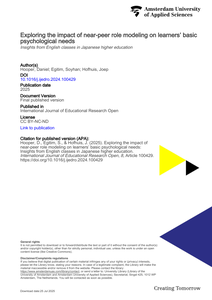Although near-peer role modeling (NPRM) has been suggested as an effective pedagogical intervention for boosting confidence, motivation, and self-efficacy, few studies have examined its connection with learner needs and well-being utilizing an established psychological framework. The present study investigates the pedagogical role of NPRM within English classes in Japanese higher education from the perspective of basic psychological need (BPN) satisfaction and frustration. In this two-phase explanatory mixed methods study, two quantitative scales were utilized to assess the significance of the connections between NPRM and six subcategories of BPN satisfaction or frustration. Subsequently, a qualitative investigation with a more limited sample size was conducted to elucidate and expand upon these associations. The quantitative findings revealed NPRM to be a significant predictor of students’ autonomy and relatedness satisfaction and exhibited a negative correlation with students' autonomy and relatedness frustration. However, no discernible association was observed between NPRM and competence satisfaction or frustration. The qualitative data revealed that the students’ mixed feelings of competence may have stemmed from low confidence and L2 self-concept with some students comparing themselves unfavorably to near-peer role models. The study highlights the need for NPRM interventions to be accompanied by instruction related to learner beliefs or growth mindsets.
DOCUMENT

Background: The aim of this study is to validate a newly developed nurses' self-efficacy sources inventory. We test the validity of a five-dimensional model of sources of self-efficacy, which we contrast with the traditional four-dimensional model based on Bandura's theoretical concepts. Methods: Confirmatory factor analysis was used in the development of the newly developed self-efficacy measure. Model fit was evaluated based upon commonly recommended goodness-of-fit indices, including the χ2 of the model fit, the Root Mean Square Error of approximation (RMSEA), the Tucker-Lewis Index (TLI), the Standardized Root Mean Square Residual (SRMR), and the Bayesian Information Criterion (BIC). Results: All 22 items of the newly developed five-factor sources of self-efficacy have high factor loadings (range .40-.80). Structural equation modeling showed that a five-factor model is favoured over the four-factor model. Conclusions and implications: Results of this study show that differentiation of the vicarious experience source into a peer- and expert based source reflects better how nursing students develop self-efficacy beliefs. This has implications for clinical learning environments: a better and differentiated use of self-efficacy sources can stimulate the professional development of nursing students.
DOCUMENT

Objectives: To understand healthcare professionals' experiences and perceptions of nurses' potential or ideal roles in pharmaceutical care (PC). Design: Qualitative study conducted through semi-structured in-depth interviews. Setting: Between December 2018 and October 2019, interviews were conducted with healthcare professionals of 14 European countries in four healthcare settings: hospitals, community care, mental health and long-term residential care. Participants: In each country, pharmacists, physicians and nurses in each of the four settings were interviewed. Participants were selected on the basis that they were key informants with broad knowledge and experience of PC. Data collection and analysis: All interviews were conducted face to face. Each country conducted an initial thematic analysis. Consensus was reached through a face-to-face discussion of all 14 national leads. Results: 340 interviews were completed. Several tasks were described within four potential nursing responsibilities, that came up as the analysis themes, being: 1) monitoring therapeutic/adverse effects of medicines, 2) monitoring medicines adherence, 3) decision making on medicines, including prescribing 4) providing patient education/information. Nurses' autonomy varied across Europe, from none to limited to a few tasks and emergencies to a broad range of tasks and responsibilities. Intended level of autonomy depended on medicine types and level of education. Some changes are needed before nursing roles can be optimised and implemented in practice. Lack of time, shortage of nurses, absence of legal frameworks and limited education and knowledge are main threats to European nurses actualising their ideal role in PC. Conclusions: European nurses have an active role in PC. Respondents reported positive impacts on care quality and patient outcomes when nurses assumed PC responsibilities. Healthcare professionals expect nurses to report observations and assessments. This key patient information should be shared and addressed by the interprofessional team. The study evidences the need of a unique and consensus-based PC framework across Europe.
LINK